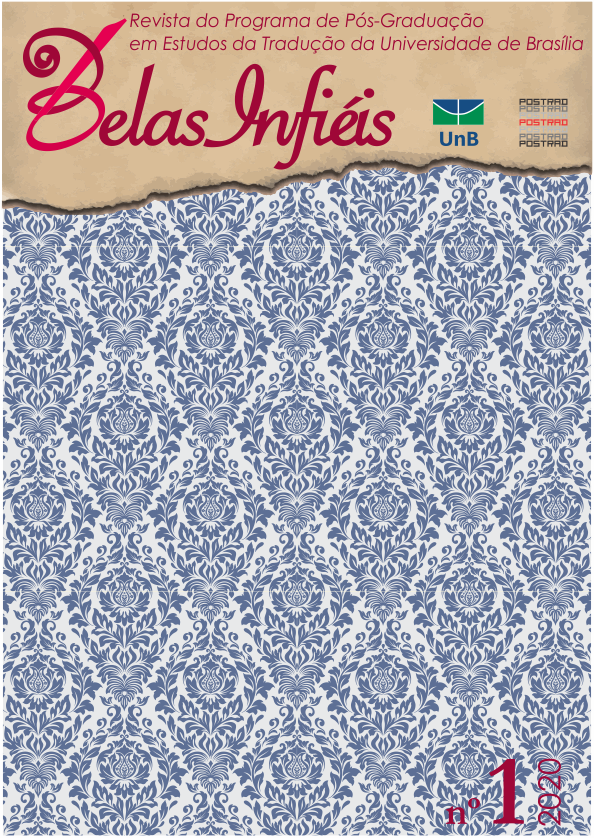O conceito bermaniano de “estrangeiro” sob o prisma da tradução pós-colonial
DOI:
https://doi.org/10.26512/belasinfieis.v9.n1.2020.28143Palabras clave:
Antoine Berman. Pós-colonialismo. Teorias pós-modernas. Vernaculização literária. Ética da tradução.Resumen
O conceito bermaniano de “a prova do estrangeiro” é particularmente capaz de elucidar e explicar a prática tradutória pós-colonial. A escrita literária em línguas europeias na África é caracterizada pela vernaculização e pela diglossia literária como estratégia de escrita em um contexto de comunicação intercultural. O emprego de línguas coloniais suscita questões de identidade e de ideologia, assim como o problema das relações de poder entre o centro e a periferia. A estratégia de desterritorialização e de reterritorialização, frequentemente utilizada por escritores pós-coloniais para tentar se reapropriar da língua colonial e reivindicar seu espaço próprio, é um exemplo do que Berman chama de “a escrita-de-tradução”. Esse estilo de escrita tem fundamentos ideológicos e socioculturais e coloca questões importantes relativas à s escolhas tradutórias, questões à s quais apenas se pode esperar responder por meio de uma ética séria e global da tradução. As teorias pós-modernas podem contribuir para a definição de um quadro ético da tradução que permite se distanciar da dicotomia presente na base de grande parte das teorias em tradutologia e que opõe a tradução estrangeirizadora à tradução domesticadora.
Referencias
BERMAN, Antoine. Les tours de Babel: essais sur la traduction. Mauvezin: Trans-europ repress, 1985.
BERMAN, Antoine. Pour une critique des traductions: John Donne. Paris: Gallimard, 1995.
BHABHA, Homi K. The Location of Culture. London: Routledge, 1994.
DERRIDA, Jacques. L'écriture et la différence. Paris: Seuil, 1967.
DERRIDA, Jacques. Positions. Paris: Minuit, 1972.
LECERCLE, Jean-Jacques. The Violence of Language. London: Routledge, 1990.
LEWIS, Philip E. The Measure of Translation Effects. In: VENUTI, Lawrence. The Translation Studies Reader. London: Routledge, 1985. p. 264-283.
MEHREZ, Samia. Translation and the Postcolonial Expérience. In: VENUTI, Lawrence. Rethinking Translation. London: Routledge, 1992. p. 120-138.
OKARA, Gabriel. The Voice. London: Heinemann, 1964.
OKARA, Gabriel. La voix. Tradução: J. Sevry. Paris: Hatier, 1985.
TINE, Alioune. La diglossie linguistique et la diglossie littéraire et leurs effets dans la pratique esthétique d’Ousmane Sembène. In: TINE, Alioune. Littérature et cinéma em Afrique francofone: Ousmane Sembène et Assia Djebar. Paris: L’Harmattan, 1995. p. 82-97.
VENUTI, Lawrence. The Translator’s Invisibility: A History of Translation. London: Routledge, 1995.
VENUTI, Lawrence. The Scandals of Translation: Towards an Ethics of Difference. London: Routledge, 1998.
VENUTI, Lawrence. The Translation Studies Reader. London: Routledge, 2000.
Descargas
Publicado
Número
Sección
Licencia
Copyright Statement
Given the public access to this journal, the texts are free to use but requires the recognition of the original authorship and initial publication in this journal to be properly stated.
The journal allows the use of works published for non-commercial purposes, including the right to submit the work to publicly accessible databases. Published contributions are the sole and exclusive responsibility of the author(s).
- When submitting papers to be evaluated by the Belas Infiéis journal, the author(s):
- Declare that the contents of the contributions are original and of their original creation, being entirely responsible for their content if there is an objection by third parties.
- Claim to be aware that they should not commit academic plagiarism.
- Declare that the manuscript has not been published, completely or partially, in Portuguese or another language. If it is a translation it should be submitted to the Translated Articles section.
- Declare that the manuscript is not being evaluated by other journals.
- Declare that the manuscript was not submitted to another journal simultaneously.
- Commit(s) to inform the journal of any kind of error or inaccuracy in their contribution (published, in evaluation or in editing) and to collaborate with the editors to make due corrections of the article (when in evaluation or editing) or erratum/retraction (after publication).
- Declare that there is no conflict of interest regarding the published work.
- Authorize its release if it is accepted for publication without any kind of monetary compensation.
- Agree to assign non-exclusive rights to publication to the magazine, remaining free to make their contribution available in other media as long as the publication of the first version in Belas Infiéis magazine is mentioned. They also authorize Belas Infiéis to assign their texts for reproduction in content indexers, virtual libraries and similar platforms.
- Maintain copyright and grant the journal the right of first publication, the work being licensed under theCreative Commons Attribution License.
- Is/Are allowed and encouraged to publish and distribute their work online after the editorial process, which may increase the impact and citation of the published work.
- Authorize the editorial team to make textual adjustments and to adapt the article to the publication rules, when necessary.



















